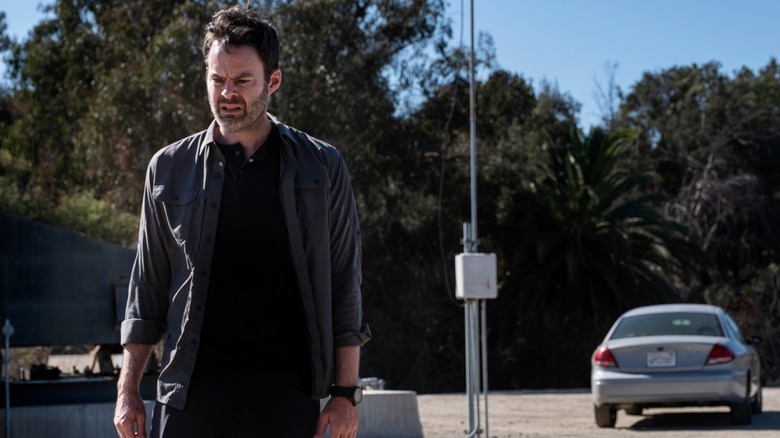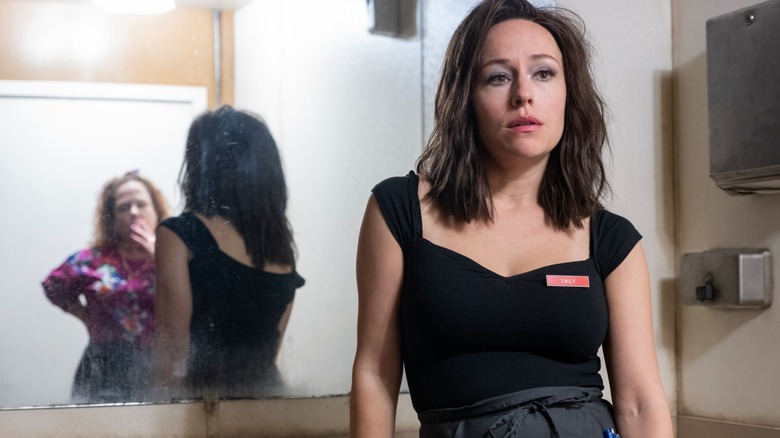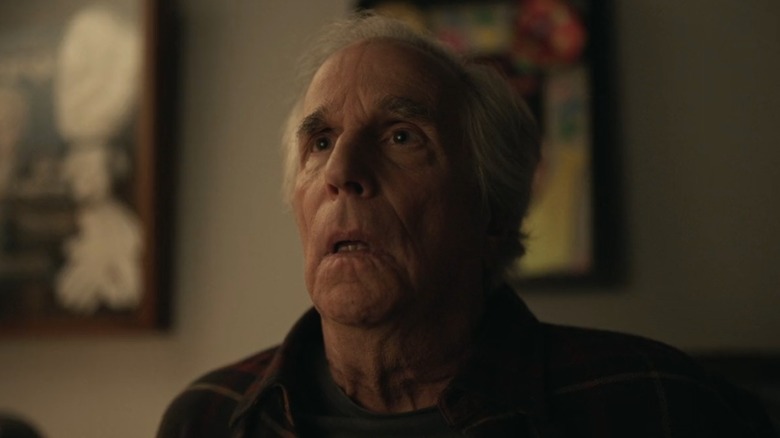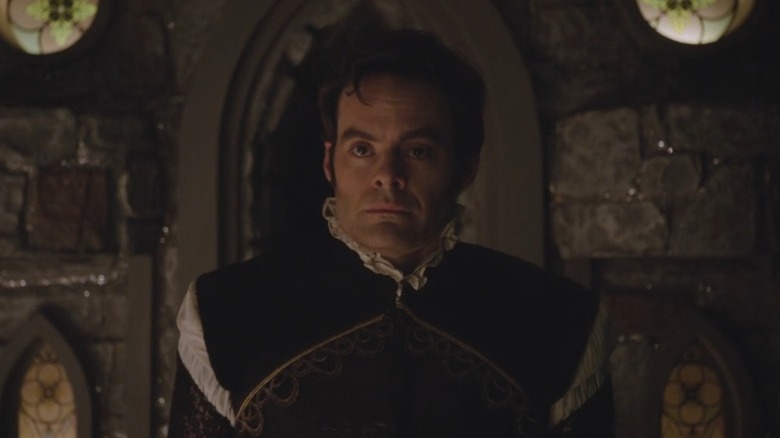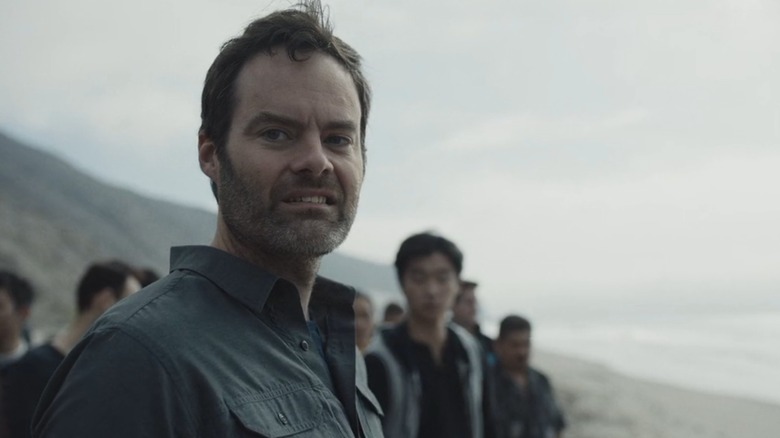Every Season Of Barry, Ranked
It's been over a year since two of the best shows in HBO history signed off on the same night, yet we're still thinking about "Barry." The series started with a bang in 2018, delivering a cool premise –- What if a hit man wanted to give it all up and become an actor? –- that soon gave way to four seasons of dark humor, brutal violence, shocking tragedy, whip-smart satire, and some of the most incredible filmmaking of the 21st century. Co-creators Alec Berg and Bill Hader were never content to let "Barry" tread water, and seemed determined to constantly reinvent the show –- in part by pushing its central character beyond his breaking point.
As "Barry" wore on, it got tougher to categorize. While awards voting bodies heaped praise upon the show's early seasons, it saw fewer wins for seasons 3 and 4: the show, at some point, became too daring for some viewers who had embraced its boldness to begin with. Those who did stick around were rewarded with a conclusion that was as shocking and subtle as it was satisfying. Let's get one thing clear here: We may be ranking the show's seasons from perfect to almost perfect, as every single season of "Barry" is phenomenal.
4. Season 4
Is it possible for a show to jump the shark when it's almost over? For all its incredible moments, "Barry" season 4 seems poised to be remembered for its polarizing time jump, a stunning surprise that the show delivered without much ado midway through season 4. There's nothing wrong with the show's decision to jump eight years ahead after Barry (Hader) escapes from prison, and it's a creative decision that benefits the show's endgame in several key ways. Yet "Barry" has always been a character study, and even though the slow burn fifth episode allows viewers plenty of time to get to know the new, depressing, mundane versions of Barry and Sally (Sarah Goldberg), it's still tough to reconcile these characters with the ones we thought we knew.
Season 4 could have benefited from a longer adjustment period, as its time jump (and the weird "Dogtooth"-like plot that comes follows) may come across as one purposely alienating writing choice too many. Still, by this point, Berg and Hader have proven themselves to be master storytellers with plans worth trusting, and the show's conclusion does not disappoint. Its finale is sweet and heartbreaking, abrupt and stressful, and, yes, still funny. The episode "wow" rewards repeat viewings and close reads, especially in the epilogue scenes that see Sally safe and content while Hollywood continues to warp Barry's legacy.
The show's final season includes some tremendous directorial choices as well, though none are quite as memorable as the season 3 motorcycle chase or all of "ronny/lily." Hader shoots Barry's prison escape, his shadowy reunion with Sally, a terrifying "break-in" scene, and much of the finale with the precision of a seasoned filmmaker; time and again, he delivers flawless visuals that create a delicious dissonance, as the feelings they (and Barry himself) are meant to evoke grow more and more off-putting.
3. Season 2
In retrospect, much of "Barry" season 2 seems like the calm before the storm. It's the last season in which viewers are meant to empathize with Barry, as he still has hope for his own redemption and is still living two lives –- one as a high-functioning serial killer, one as a budding (if volatile) actor and mediocre boyfriend. The show careens into artfully constructed chaos beginning in season 3, but in the meantime, season 2 sharpens its wit, deepens its characterization, and keeps viewers on their toes thanks to Barry's very big secret.
The show's first season ends with Barry killing Janice (Paula Newsome), the police officer hot on his trail who happened to be dating his acting teacher Gene (Henry Winkler). Season 2 revolves largely around Barry's attempts to keep this secret, and the show achieves a precarious balancing act between the bleakness of Gene's grief and the unfounded optimism of Barry himself. Henry Winkler won an Emmy for the show's first season, but in its sophomore outing, his performance as a broken yet endlessly self-absorbed man is better than ever.
The second season is also extremely funny. Noho Hank (Anthony Carrigan), the clear breakout star of season 1, is given plenty of quotable zingers, but the season's most outlandish episode is "ronny/lily." It's the show's first dip into the surreal, a triumphant action epic that sees Barry face off against a seemingly super-powered little girl who just won't die. Hader's directorial eye takes center stage here, as does the show's penchant for great action and well-oiled stunt choreography. If season 2 has a weakness, it's simply that despite its feral child centerpiece, it seems tame in comparison to what would come after.
2. Season 1
In its first season, "Barry" didn't just feel like a revelation; it felt like a show that intended to break down everything we thought we knew about comedy and antihero-driven drama and rebuild it from the ground up. "Barry" would become that show and then some, but early on, it knocked our socks off simply with a high concept plot and some effortless-looking execution. The show's very first episode showcased what would become Hader's signature directorial sensibilities: a strong sense of irony, an ability to build maximum suspense within a single shot setup, and agile filmmaking that matches a show full of sudden tone changes beat for beat.
On first watch, some of "Barry" season 1 feels imperfect, but those imperfections were ultimately in service of a story that would unfold over all four seasons. The show uses war in the Middle East as a backdrop for its flawed protagonist's trauma, but it later subverts that dehumanizing trope by revealing Barry to be an outright villain who's undeserving of redemption. His true colors begin to bleed through by season's end, with help from a tremendous one-two punch of episodes directed by Hiro Murai (whose clean, suspenseful filmmaking style would go on to define the show even once he'd left) and Berg. In them, Barry's attempt to reunite with an old war buddy goes awry, leading to a propulsive airfield showdown, a horrifying killing, and Barry's first truly great performance as an actor. They're two great episodes in a season that has exactly zero duds.
1. Season 3
The best season of "Barry" is the one that led nearly every critic who reviewed it to include a warning label of sorts: this sh*t gets dark. No, really. How much darker could a series about a hit man coming undone at the seams get? The answer becomes clear in the season premiere, an episode that's as propulsive and action-packed as a typical series finale. It begins with Barry shooting innocent people in cold blood while eating a sandwich and ends with him forcing his one-time mentor Gene into the trunk of his car. The next episode arguably does more character work than any other in the series, severing Barry from viewer sympathies entirely when he re-traumatizes abuse survivor Sally, threatens to kill Gene's grandson, and suffers a complete break from reality, the likes of which he never recovers from.
The delusional and dangerous season openers are just two of "Barry" season 3's many wonders. This is also the season that nearly kills its own protagonist and makes you believe it really will. It's the season that features a stunning highway chase sequence that gives some of the best action films of all time a run for their money. Season 3 also features both Sally's painfully accurate satirical rise to fame (that press junket scene still gives me nightmares) and another stunning, game-changing finale sequence, this time one in which she kills someone herself. Plus: Hank gets his love story, Barry gets arrested, and the show introduces its most haunting motif –- a purgatorial beach on which Barry bears witness to some great, howling machine that viewers never see.
That scene, and several others in season 3, feature indelible sound design that echoes around the mind long after the credits have rolled. "Barry" is a once-in-a-generation show for what it says about fame, violence, and morality, but it's also unique for its status as a series that could very well double as a filmmaking course. It's a reminder that the best visual media isn't just storytelling with a camera; it's an entire sensory symphony composed of stunt teams, sound designers, costumers, actors, writers, directors, cinematographers, editors, music coordinators, and more. When every single one of those departments is firing on all cylinders, that's how you get "Barry." It's a shocker of a show that broke the rules every step of the way, and it never did it better than in season 3.
